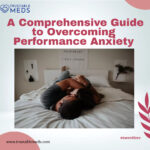Introduction
Defining the Issue
Erectile Dysfunction (ED): A Brief Overview
Erectile Dysfunction, commonly known as ED, is a prevalent condition affecting men globally. It denotes the persistent incapacity to attain or uphold an erection that is satisfactory for fulfilling sexual activity. While occasional difficulties are normal, persistent challenges can significantly impact a man’s quality of life. Tadalista 60 mg
is used to treat erectile dysfunction or male insufficiency.
Importance of Addressing ED
Impact on Quality of Life
The ramifications of ED extend beyond the bedroom. It may result in emotions of frustration, embarrassment, and a decrease in self-esteem. Relationships may strain, and overall life satisfaction can be compromised.
Psychological Consequences
The psychological impact of erectile dysfunction should not be overlooked. Anxiety and depression often accompany this condition, creating a vicious cycle that further exacerbates sexual difficulties. Addressing ED is crucial not only for physical well-being but also for mental and emotional health.
Understanding the Pelvic Floor
The Role of the Pelvic Floor
Anatomy and Function
The pelvic floor, a group of muscles situated at the base of the pelvis, plays a pivotal role in supporting the pelvic organs, including the bladder and rectum. These muscles also contribute to sexual function, aiding in erection and ejaculation.
Connection to Sexual Health
A healthy pelvic floor is essential for optimal sexual performance. Weakness or dysfunction in these muscles can contribute to ED. Understanding the correlation between pelvic floor health and erectile function is the first step toward unlocking one’s sexual potential.
Common Causes of Pelvic Floor Dysfunction
Sedentary Lifestyle
Prolonged periods of sitting can weaken the pelvic floor muscles. Incorporating movement and exercise into your routine is crucial for maintaining their strength.
Aging
As men age, the pelvic floor muscles may naturally weaken. However, this process can be slowed, and function maintained through targeted exercises.
Medical Conditions
Certain health issues, such as obesity and diabetes, can impact the pelvic floor. Managing these conditions is integral to preventing pelvic floor dysfunction and associated ED.
The Science Behind Pelvic Floor Exercises
How Pelvic Floor Exercises Help
Strengthening Muscles
Pelvic floor exercises, commonly known as Kegel exercises, involve contracting and relaxing the pelvic muscles. Regular practice enhances muscle tone, improving their ability to support the pelvic organs and contribute to sexual function.
Improving Blood Flow
Engaging the pelvic floor muscles increases blood flow to the genital area, promoting overall sexual health. Improved circulation is crucial for achieving and sustaining erections.
Types of Pelvic Floor Exercises
Kegel Exercises
To perform Kegels, contract the pelvic floor muscles for a few seconds, then relax. Repeat these contractions multiple times throughout the day.
Reverse Kegels
Reverse Kegels involve consciously relaxing the pelvic muscles, helping to release tension and improve overall pelvic floor function.
Squats and Lunges
Incorporating compound exercises like squats and lunges into your workout routine engages the pelvic floor muscles and contributes to their strength.
Integrating Pelvic Floor Exercises into Your Routine
Developing a Customized Exercise Plan
Frequency and Duration
Start with a few minutes of pelvic floor exercises daily, gradually increasing both the duration and intensity. Maintaining consistency is crucial for observing positive outcomes.
Progressive Training
As you build strength, consider adding variations and increasing the difficulty of your exercises. This progressive approach ensures continued improvement.
Tips for Consistency
Setting Reminders
Incorporate pelvic floor exercises into your daily routine by setting reminders on your phone or associating them with specific activities, like brushing your teeth.
Incorporating into Daily Activities
Perform discreet pelvic floor exercises during everyday tasks, such as sitting at your desk or waiting in line. These subtle movements contribute to consistent muscle engagement.
Dietary Considerations for Erectile Health
Nutrients Essential for Sexual Function
Nitric Oxide Boosters
Nitric oxide plays a crucial role in vasodilation, enhancing blood flow to the genital area. Include foods rich in nitric oxide, such as beets and garlic, in your diet.
Omega-3 Fatty Acids
Omega-3 fatty acids support cardiovascular health, positively impacting blood circulation. Fatty fish, flaxseeds, and walnuts are excellent sources.
Foods to Include in Your Diet
Dark Leafy Greens
Rich in antioxidants, dark leafy greens like spinach and kale promote overall vascular health, supporting erectile function.
Nuts and Seeds
Almonds, sunflower seeds, and pumpkin seeds provide essential nutrients, including zinc, crucial for reproductive health.
Fruits rich in antioxidants
Berries, citrus fruits, and watermelon are packed with antioxidants, protecting blood vessels and supporting sexual health.
Lifestyle Changes for Optimal Sexual Well-being
Managing Stress
Mindfulness Techniques
Incorporate mindfulness practices, such as meditation and deep breathing, to manage stress levels. Chronic stress can contribute to ED, making stress management vital.
Relaxation Exercises
Engage in activities that promote relaxation, such as yoga or a warm bath. Relaxing the body and mind positively impacts sexual well-being.
Importance of Quality Sleep
Sleep Hygiene Tips
Establish a consistent sleep routine, creating a conducive environment for restorative sleep. Quality sleep is integral to hormonal balance and sexual health.
Relationship Between Sleep and Sexual Health
The connection between sleep and sexual well-being is profound. Prioritize sufficient and quality sleep to optimize hormonal balance and support overall sexual function.
Seeking Professional Help
When to Consult a Healthcare Professional
Persistent ED Symptoms
If ED persists despite lifestyle changes, seeking professional guidance is essential. Underlying health issues may require specialized intervention.
Underlying Health Conditions
Certain medical conditions, like cardiovascular disease or hormonal imbalances, can contribute to ED. Identifying and addressing these issues is crucial for effective treatment.
Available Treatment Options
Medications
Prescription medications, such as Viagra or Cialis, may be recommended to address ED symptoms. Consultation with a healthcare provider is necessary to determine the most suitable option.
Therapies
Counseling and therapy can be beneficial, especially when psychological factors contribute to ED. Open communication and professional guidance are key elements of successful therapy.
Surgical Interventions
In some cases, surgical interventions, such as penile implants, may be considered. These options are typically reserved for cases where other treatments prove ineffective.
Conclusion
In conclusion, understanding and addressing erectile dysfunction involves a comprehensive approach. By integrating pelvic floor exercises, dietary considerations, lifestyle changes, and seeking professional help when necessary, individuals can unlock their sexual potential and enhance overall well-being.
FAQs
1. Can pelvic floor exercises cure erectile dysfunction?
While pelvic floor exercises can significantly improve erectile function by strengthening relevant muscles and improving blood flow, they may not cure all cases of ED. If symptoms persist or become severe, it is advisable to seek consultation with a healthcare professional.
2. How long does it take to see results from pelvic floor exercises?
Results vary, but consistent practice over several weeks is typically needed to observe significant improvements. Patience and dedication to the exercise routine are key.
3. Are there any side effects to pelvic floor exercises?
When performed correctly, pelvic floor exercises generally have no adverse effects. However, consulting with a healthcare provider before starting any new exercise regimen is advisable.
4. Can lifestyle changes alone improve erectile dysfunction?
In many cases, yes. Lifestyle changes, including exercise, a healthy diet, stress management, and quality sleep, can have a profound impact on erectile function. However, individual responses may vary.
5. When should I seek professional help for erectile dysfunction?
If erectile dysfunction persists or is accompanied by other concerning symptoms, such as pain or changes in urinary habits, it’s crucial to consult a healthcare professional promptly.



